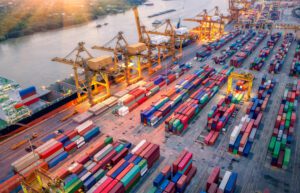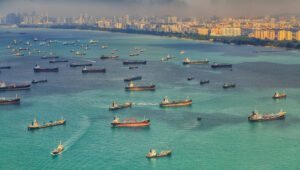Sam Mulopulos is a Senior Policy Advisor at the Trade Subcommittee of the House Ways and Means Committee. The opinions and views expressed in this paper are the personal views of the author, who recently returned from New Zealand where he served as an Ian Axford Fellow in Public Policy.
Recent shocks like the COVID-19 pandemic and Russia’s invasion of Ukraine have demonstrated the fragility of many critical supply chains. In some cases, firms have built supply chains so fabulously long and complex that, despite the efficiency gains, they are worryingly brittle. In others, non-market autocracies have engaged in unfair trade and economic practices to promote dependency and overreliance. In response, open societies have proposed a myriad of policy interventions to make their supply chains more resilient. This includes investments in domestic manufacturing and new trade agreements to diversify sources of risk. Yet, these interventions have generally not benefited from an organized approach; plenty of practice, but little theory.
Tension exists, over the short-term, between resilient and efficient supply chains. Investments to build resilient supply chains marginally reduce their efficiency just as policies to make supply chains more efficient can undermine their resilience. The challenge for policymakers is to navigate this trade-off to find a balance which promotes societal well-being. In service of that end, this project intends to be a guide for policymakers.
It begins with a theoretical framework for supply chain resilience arguing for an approach centered on supply chain vulnerabilities. Policymakers can identify, and even quantify, various supply chain vulnerabilities, such as overreliance on China for critical minerals or excessive import reliance for personal protective equipment (PPE). Vulnerabilities, by themselves, do not cause harm. However, shocks—wars, pandemics, or natural disasters—exploit these vulnerabilities to reduce societal well-being. Policymakers can mitigate the impact of shocks by building resilience against those vulnerabilities. Since not all vulnerabilities threaten critical functions like national security or the life and health of citizens (e.g. New Zealand is heavily import dependent on furniture), policymakers should prioritize building resilience against the most critical vulnerabilities…
Combining theory and practice, this project concludes with action. It proposes the Security and Trade Agreement for Resilience (STAR), a new plurilateral agreement for supply chain resilience. The STAR would unite open societies to deploy all three types of interventions to build resilience comprehensively. It would liberalize trade in the most critical goods, require parties to make minimum investments in domestic manufacturing, promote trade facilitation and short-supply cooperation, and include provisions targeted at the unfair practices used by non-market autocracies to undermine supply chain resilience. In proposing the STAR, this project also offers a case study for how policymakers would use the Supply Chain Resilience Checklist to effectively deploy interventions in response to supply chain vulnerabilities.
|
Following is an excerpt from a report on the roundtable discussion hosted by the Clayton Yeutter Institute of International Trade and Finance at the University of Nebraska-Lincoln on March 2, 2023.
The United States has not been engaging in traditional free trade agreements with tariff elimination or reduction for the past few years. Other countries like the EU, Canada, Japan, and Australia have been, though, and this often leaves U.S. exporters at a relative disadvantage.
Notwithstanding, market access is not all about tariffs, especially in agriculture. Technical regulations and SPS barriers can be as restrictive and costly as a tariff.
The WTO SPS Agreement provides a baseline. All WTO members signed on to the WTO SPS Agreement, which encourages governments to establish national SPS measures consistent with international standards, guidelines, and recommendations, and based on science and risk assessments. SPS provisions are important because they incorporate the science and risk analysis provisions. The agreement has withstood the test of time and continues to provide a sound and viable framework for all countries regardless of developing country status. Roundtable participants also agreed that future trade agreements should address new and emerging issues, including as the science advances on the benefits of biotechnology.
USMCA is the first U.S. trade agreement to include agricultural biotechnology provisions (whereas TPP and its successor agreement, the CPTPP, did not). The SPS and biotech provisions in USMCA, and even the U.S.-China Phase One agreement, are examples of how to incorporate modern agriculture issues in new ways that are consistent with the WTO SPS Agreement. Note that it is the SPS provisions of USMCA that USTR is currently disputing with Mexico on corn.
Developing countries don’t always have the infrastructure to test or approve biotech products, and some countries have indicated that they will approve a new product only after five other countries have done so. More consistency or at least compatibility in the gene editing regulatory space would facilitate trade.
Europe still maintains relatively strict regulations on biotechnology that can hinder advancements. Participants noted that U.S. and EU officials meet semiannually for U.S.-EU biotech consultations, but some questioned the usefulness of these talks. The days of FTAs are not necessarily over forever, but in agriculture we need transparency and science-based regulatory approaches as much as we need traditional market access. So, to the extent an FTA is not possible with a particular country or region, then our negotiators can shift the negotiations toward these other key areas and move forward with advocating for transparent, science-based regulatory processes. This is especially advantageous for developing countries that face a more acute need to improve their own productivity to feed their people.
|
The era of Western-led globalization has been replaced by a developing struggle between the United States and China. From a Western point of view, the major challenge emerges from a competition between nations that support liberal values and proponents of authoritarianism, with profound implications for the global economy.
Mixing international trade with geopolitical rivalries is going to be the new norm. This is a regrettable development, even more so because most Asian economies – and particularly the success stories of China, South Korea and Japan – were able to grow thanks to access to global markets and expanding trade.
The Chinese economic miracle would have been impossible without these opportunities. Had the West not built the post-World War II structure of international trade and finance, China could have never emerged from the poverty it suffered after the death of former Chinese leader Mao Zedong. In a sense, one might think that China should today be paying back this debt, taking on responsibility for supporting a functioning world economy. Instead, trade in Asia is regressing. (This is not to overlook the role of American policy, during both the Trump and Biden administrations, in politicizing trade in Asia.)
The major uncertainty lies in the Global South. While not as prominent as the Non-Aligned Movement of the Cold War, the Global South is now one of the major geopolitical challenges facing the West, particularly on issues around trade.
|
|
In general, the evidence indicates that FTAs have benefited the American economy. They have contributed to lower prices for American consumers and have boosted growth and employment. Better policies ought to be implemented by political parties in order for these benefits to continue. Due to different views on trade agreements, this is still uncertain. As a result of trade negotiations and open trading agreements, member nations have seen economic, political, and production growth. By examining the overall effects of FTAs with the United States, this study contributes to the existing body of research on the topic.
The United States of America and its allies have demonstrated economic and political expansion, as well as an increase in imports and commodities. The impact on a smaller business in the economy and the formation of a group of opponents are key outcomes here. We have observed that, in the grand scheme of things, free trade regulations benefit the majority of businesses, and smaller businesses can pivot or expand to maintain market relevance. Trade agreements are a crucial tool for nations seeking to promote prosperity and economic growth. To balance the interests of all parties, they must be properly developed.
By its participation in organizations such as the World Trade Organization and the North American Free Trade Agreement, the United States has been a pioneer in advocating free trade. It will be essential for nations to keep cooperating to develop trade policies that are advantageous to all parties as the global economy develops.
Dealing with issues related to environmental and labor standards is one of the major difficulties in FTA negotiations. FTAs have the potential to enhance economy, but there is also a chance that they may lead to worsening labor conditions and environmental deterioration. To address these issues, there has been an increasing focus on including labor and environmental measures in recent years. For instance, the United States-Mexico-Canada Agreement (USMCA) has clauses that protect the environment and the rights of workers by, among other things, mandating Mexico to tighten its labor laws and undertake pollution control measures. By addressing social and environmental issues, these clauses can ensure that FTAs encourage sustainable and equitable growth.
|
|





